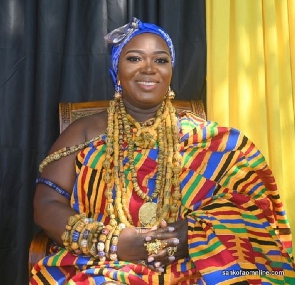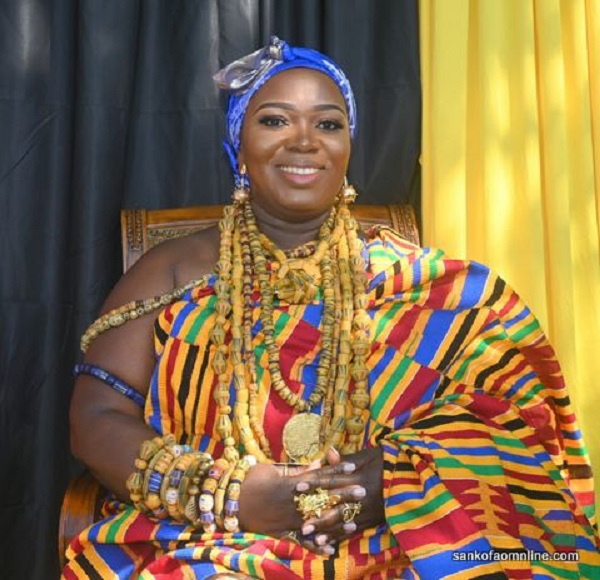 Mama Nunyati I ( Mrs. Debora A. Sackor )
Mama Nunyati I ( Mrs. Debora A. Sackor )
In a burst of vibrant colors, infectious rhythms, and jubilant celebrations, the much-awaited GhanaFest was held from 11 am to 10 pm in Washington Park. The annual extravaganza, which attracts thousands of locals and visitors from many different American States, kicked off brilliantly and held its promise to be a day-long celebration of Ghana’s rich culture, heritage, and traditions.
Mr. James Nanor, who has been attending Ghanafest for the past 15 years except during the COVID-19 Pandemic, adjudged this GhanaFest, by the new Kassim Abubakari regime, as one of the best organized in recent memory.
GhanaFest serves as a unifying force, bringing together diverse communities from across the country to revel in the beauty of their shared cultural heritage. People from different ethnic backgrounds, tribes, and regions gather in one place to showcase their unique traditions, food, dance, music, and craftsmanship.
The festival had captivating dancing and parades in the park, led by costumed performers adorned with traditional Ghanaian attire. Dancers, musicians, and artists representing various tribes and regions added to the spectacle, providing onlookers with a visual feast of Ghana's cultural diversity.
The president of the Ghana National Council, the main sponsor, and organizer of GhanaFest, Mr. Kassim Abubakar, addressed the festival with a speech thanking all patrons, sponsors, and vendors for their support and asking the Ghanaian Community to continue being united and to promote growth and development for the common good.
Mr. Abubakar spoke about the long-awaited Ghana House, which is a project the Council has in the pipeline. He ended the speech “urging all community members to avoid taking shortcuts to achieve success or the American Dream due to reports of arrest and incarcerations of some Ghanaians engaging in fraudulent activities.”

After the Gospel hour, opening prayers, singing of the national anthems of the USA and Ghana, and the traditional sprinkling of Kpoikpoi, there was a cultural performance by the Ewe Association of Chicago in which its members ushered into office a newly elected Queenmother and two sub-Queens, two months after voting overwhelmingly to confirm them. At a short ceremony, there was pouring of libation, holy men delivered invocations, and all the newly elected Queens swore allegiance to uphold the Constitution of the Ewe Association and to serve diligently. The new Queenmother will go by the Royal name, Mama Nunyati I (Deborah Ameyedowo). Her right and left-hand Queenmothers are Mama Sedudzi I(Empress Mawusi Kudjawu) and Mama Semekor I (Rita Fiadzoe-Tawiah), respectively.

“It’s an honor to be chosen Queenmother of our community and lots of responsibility,” Mama Nunyati said. Her predecessor Mama Awushie Adjaho I, expressed she hopes the new Queenmother can continue to “bring our Women together and make sure there’s unity in our Association.”

The affiliate organizations who also sponsored GhanaFest treated visitors to an array of traditional performances, parades, and dances. Energetic Ghanaian music reverberated through the air, captivating audiences of all ages; each performance brought an authentic glimpse into Ghana's history and way of life. The best-organized and best-dressed Royal Court was Okuapeman Fekuw.

One of the highlights of the Ghana Festival is its delectable array of traditional cuisine. Food stalls lined the festival grounds, offering a wide range of mouthwatering dishes. Visitors had the chance to savor local delicacies such as banku, jollof rice, fufu, and kelewele, among other delights. The aromas wafting through the air tempted even the most discerning taste buds, making it an unforgettable culinary experience.
Local, Ghanaian, and African artisans showcased their exquisite craftsmanship at the festival's art and craft exhibitions. Visitors were able to witness African-themed masterpieces, including hand-woven Kente cloth, intricately carved wooden sculptures, and vibrant beadwork. The exhibitions celebrated the artisans' creativity and allowed them to earn recognition and support for their craft.
Ghana Fest has become an essential platform for promoting business in Ghana. Real Estate companies selling luxury condos and houses were present, along with companies offering services such as shipping and prepaid wireless and electricity. This influx of Ghanaian businesses fosters entrepreneurship, cultural exchange and strengthens global bonds.

Latifah Fuseini, a Moshie Ghanaian, who started coming to Ghanafest when she immigrated to Chicago 10 years ago, has been selling beads at the Fest for the last two years. “I will never miss GhanaFest. I come here for the culture. It feels like being home today.”
With an attendance of approximately 5000 people, the Firehouse Community Arts Center was one of the approximately thirty vendors present. Based in the North Lawndale neighborhood, their mission is to stop violence through arts and faith. “We are planning to take 20 to 30 young people, ages 16-25, to Ghana this fall. We want them to understand who they are and get a taste of the food I had in Ghana,” said Terrance Foster, supervisor and youth mentor.

As the sun set at the GhanaFest, we saw the performance of Ashanti rapper Sarkodie, who is one of Africa’s fastest rappers and the winner of BET's Best International Flow Artist at the 2019 BET Hip Hop Awards and the Vodafone Ghana Music Award for "Artiste of the Decade." The crowd danced happily to some of his famous rap songs in his native Twi and English.

Sarkodie performing at the GhanaFest
The GhanaFest in Chicago stands as a symbol of pride for Ghanaians in the U.S. and is a shining example of how cultural diversity can be a powerful tool in bringing people together. As the last notes of modern Ghanaian rap music faded away and the last taste of local delicacies lingered on visitors’ palates, the spirit of unity and celebration will continue to resonate in the hearts of all who were fortunate enough to be part of this extraordinary event.
